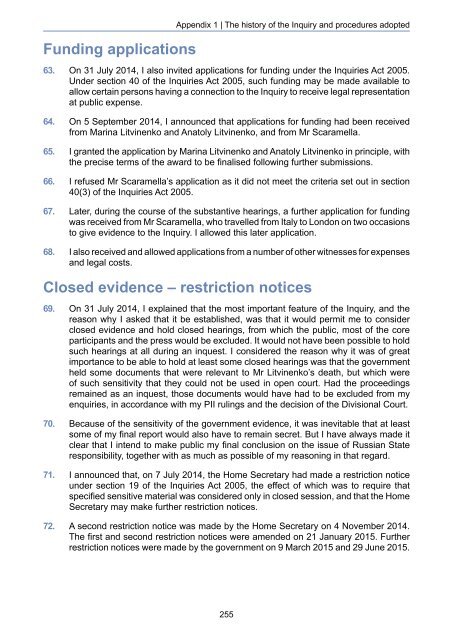The Litvinenko Inquiry
JIEp7Zyr
JIEp7Zyr
Create successful ePaper yourself
Turn your PDF publications into a flip-book with our unique Google optimized e-Paper software.
Funding applications<br />
Appendix 1 | <strong>The</strong> history of the <strong>Inquiry</strong> and procedures adopted<br />
63. On 31 July 2014, I also invited applications for funding under the Inquiries Act 2005.<br />
Under section 40 of the Inquiries Act 2005, such funding may be made available to<br />
allow certain persons having a connection to the <strong>Inquiry</strong> to receive legal representation<br />
at public expense.<br />
64. On 5 September 2014, I announced that applications for funding had been received<br />
from Marina <strong>Litvinenko</strong> and Anatoly <strong>Litvinenko</strong>, and from Mr Scaramella.<br />
65. I granted the application by Marina <strong>Litvinenko</strong> and Anatoly <strong>Litvinenko</strong> in principle, with<br />
the precise terms of the award to be finalised following further submissions.<br />
66. I refused Mr Scaramella’s application as it did not meet the criteria set out in section<br />
40(3) of the Inquiries Act 2005.<br />
67. Later, during the course of the substantive hearings, a further application for funding<br />
was received from Mr Scaramella, who travelled from Italy to London on two occasions<br />
to give evidence to the <strong>Inquiry</strong>. I allowed this later application.<br />
68. I also received and allowed applications from a number of other witnesses for expenses<br />
and legal costs.<br />
Closed evidence – restriction notices<br />
69. On 31 July 2014, I explained that the most important feature of the <strong>Inquiry</strong>, and the<br />
reason why I asked that it be established, was that it would permit me to consider<br />
closed evidence and hold closed hearings, from which the public, most of the core<br />
participants and the press would be excluded. It would not have been possible to hold<br />
such hearings at all during an inquest. I considered the reason why it was of great<br />
importance to be able to hold at least some closed hearings was that the government<br />
held some documents that were relevant to Mr <strong>Litvinenko</strong>’s death, but which were<br />
of such sensitivity that they could not be used in open court. Had the proceedings<br />
remained as an inquest, those documents would have had to be excluded from my<br />
enquiries, in accordance with my PII rulings and the decision of the Divisional Court.<br />
70. Because of the sensitivity of the government evidence, it was inevitable that at least<br />
some of my final report would also have to remain secret. But I have always made it<br />
clear that I intend to make public my final conclusion on the issue of Russian State<br />
responsibility, together with as much as possible of my reasoning in that regard.<br />
71. I announced that, on 7 July 2014, the Home Secretary had made a restriction notice<br />
under section 19 of the Inquiries Act 2005, the effect of which was to require that<br />
specified sensitive material was considered only in closed session, and that the Home<br />
Secretary may make further restriction notices.<br />
72. A second restriction notice was made by the Home Secretary on 4 November 2014.<br />
<strong>The</strong> first and second restriction notices were amended on 21 January 2015. Further<br />
restriction notices were made by the government on 9 March 2015 and 29 June 2015.<br />
255


